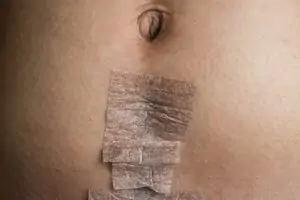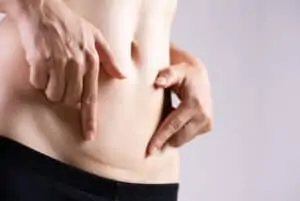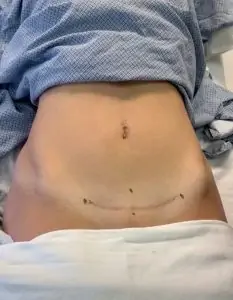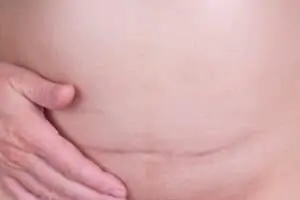Apparently, you can get a hole in your hole. I mean, the hole in your abdomen from your c-section.
Technically, it’s a hole, one that has been stitched up.
Most of the time, c-section incisions heal up just fine. There is usually little cause for concern.
But when a recent message hit my mail, I knew I’d better clear up this mystery quickly.
It sounds crazy, but holes can form in your c-section incision. Instead of healing, it opens up. But why does that happen? And how common is this exactly? Try not to worry there, Mama. Because I’ve got the answers for you below.
Why is there a hole in my c-section incision?
Someone told me I had “two small holes in my c-section incision.” When I saw that, I thought my eyebrows had popped off my face somewhere. I’d honestly not heard of this, so I did some digging.
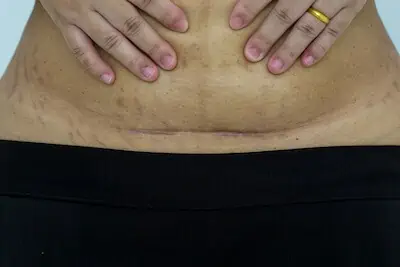
Apparently, Dr. Teena Thomas has heard of this, though it is not that common and may indicate an infection. She has seen small holes in c-section incisions, usually when it is done poorly, and about 4 weeks after the surgery. But before you panic, Dr. Thomas says she rarely sees this, so please don’t freak. It could also be a reaction to the suture material used.
Regardless, if you see a tiny infected hole in your c-section incision, you will want to get to your doctor, who will most likely prescribe antibiotics. This is easy to fix, but don’t just ignore it, ok?
How long does it take for a hole in a c-section to heal?
As holes are rare though they occasionally appear in the c-section incision, you’ll have to take it easy and let your body recover. If you’ve noticed a hole, it may take a little longer than the usual 6 weeks postpartum from a c-section.
That’s because it opens up after a few weeks, so plan for another month if your doctor has to change your sutures or secure the stitching once again to close up any holes.
What do you do if your c-section incision opens?
Again, this is really rare for a c-section incision to open up. The medical term for this is c-section dehiscence.
This outer incision can open back up sometimes, especially if you put too much pressure or strain on it. I know I panicked myself at the hospital after I had my eldest because my husband made me laugh so hard, I swore I must have ripped back open. They checked me out again and promised me I was stitched up just fine and that it hadn’t opened up.
If you want to avoid this kind of problem, listen to your doctor and do not lift anything that weighs more than your sweet little newborn. I mean it!
Other times, you may take it easy and do things just right. But your body isn’t healing up like it was designed. This could be due to your genetics or if you have a condition like diabetes. Even if you are obese, this may lead to an issue with improper c-section incision healing.
Necrosis is when you don’t get enough oxygen and blood flow to the area, resulting in poor healing. And then some infections will be painful and have gross-looking stuff around them. Basically, you’ll know something isn’t right, and you’ll want to call your doctor.
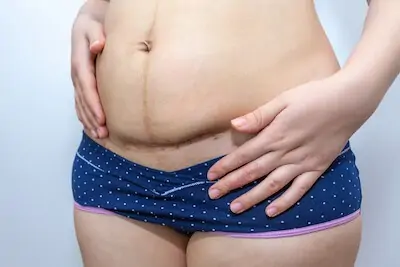
You have a greater risk factor for these things if you have a vertical c-section incision. Doctors try to do it horizontally across your pubic hairline, but there are times when cutting vertically is a necessity.
Sometimes, your internal c-section incision may open up too. Again, this is not all that common, but you will likely feel so awful that you’ll call the doctor about it. You’ll experience severe abdominal pain, dizziness, fever, vaginal bleeding, painful bathroom experiences with urination and bowel movements, or not even being able to have a bowel movement.
Honestly, this is so rare, so please try not to worry yourself. Call your doctor immediately if something looks or feels wrong (or both). They will likely give you antibiotics for a small hole in your c-section incision. If something is going on internally, they will need to perform surgery, but as I said, it is really a rare thing to happen.
The best way to avoid this is by preventing problems on your end. You’ll want to rest up, eat nutritious foods, avoid lifting or pushing anything heavier than the baby, don’t stand too long, do no strenuous exercise, have no tight clothing, and avoid sex until you have your postpartum checkup.
Signs you need immediate medical attention
If you see a hole in your c-section, call your doctor. This can be treated with antibiotics and a change to your sutures. But if you have any of the other symptoms, it’s an emergency and needs to be handled straight away:
- Your incision is bleeding
- You have a fever over 100°F
- The pain is unbearable
- Redness and/or swelling around your incision
- Vaginal bleeding that is very heavy and comes with large blood clots
- Foul-smelling discharge from the vaginal area and/or the incision itself
- It hurts when you pee
- There’s a bulge or hard item at your incision site
- You have both a fever and breast pain simultaneously
And, of course, if anything seems to concern you, call your doctor. They’ll be happy to put your mind at ease if it’s nothing to worry about, and if it is a problem, they’ll help you take care of it to get back on track again.
Right now, what I want you to do is breathe deeply. Most of what we worry about never actually comes to fruition. But if you are reading this because you noticed a hole in your c-section incision and Googled it to find out what’s going on, now you know. Call your doctor, examine the sutures, and prepare some antibiotics to help clear this mess.
Leslie Berry lives with her husband and two young daughters in Los Altos, California, where she loves helping other moms get comfortable with motherhood and embracing the insanity with facts peppered with laughs.
She loves eating too much sushi, exercising, and jamming out on her Fender. Read more about Leslie here.

